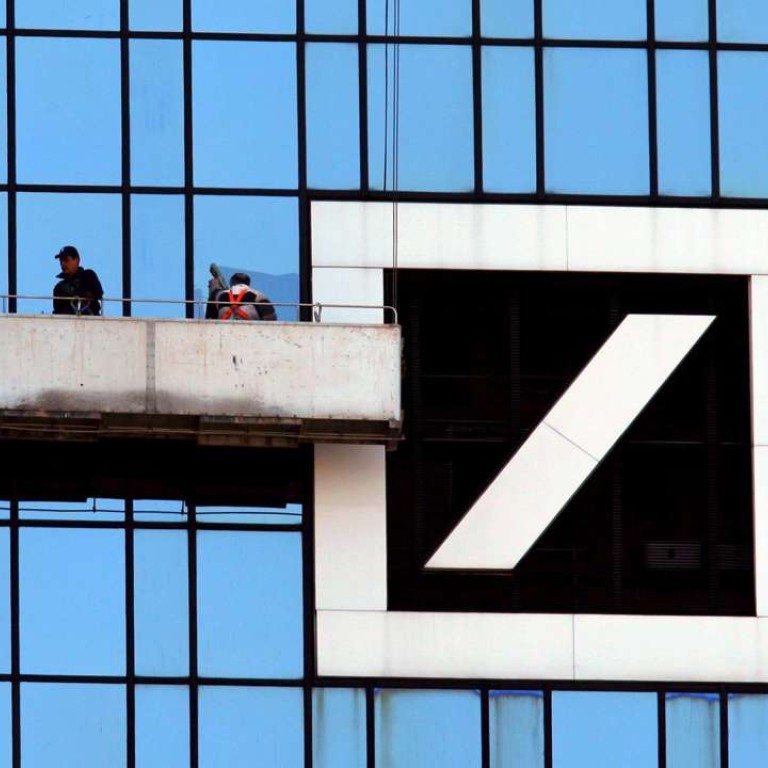
Deutsche Bank’s plight deserves a degree of sympathy
Banks live and die by their reputation, and a high-profile case like this will clearly take its toll
I kind of feel sorry for Deutsche Bank. Yes, you read that right, even though sympathising with big banks is a distinctly minority pastime, there comes a time to acknowledge that even banks can get a raw deal.
Much, but not all of this bank’s current problems stem from a US$14bn demand from the US Department of Justice in settlement of claims over Deutsche’s misselling of residential mortgage-backed securities in the lead-up to the 2008 financial crisis.
Unlike US banks, the German bank is not enjoying the luxury of having this claim settled in private and this helps explain why its shares have slumped to a two decade low.
Much of this decline is understandable as Deutsche has other problems, but hedge funds have been playing a major role in fueling the sell-off.
They are keen to lower the bank’s share price so that they can buy back the shares at bargain basement prices and cover their short positions. In case you missed it, the reason the good Lord invented hedge funds was to make bankers look good. Yet again they are performing this role with aplomb.
In another time Deutsche could have expected more vigorous support for its plight from the German government but timing is not on the bank’s side
It remains to be seen whether Deutsche will actually have to cough up the full $14bn but if it does so it will be the second biggest ever payment of this kind, topped only by a $16.7bn Bank of America settlement.
However this involved a far greater number of claimants. Other US banks, facing similar problems, have got off far more lightly.
In another time Deutsche could have expected more vigorous support for its plight from the German government but timing is not on the bank’s side as the Merkel administration is under extreme pressure and the last thing that it wants is to be seen propping up bankers, although it may end up providing some form of financial assistance.
Deutsche, Germany’s biggest bank, is also facing a degree of scepticism over the value of its assets, but unlike other banks that have got into trouble it is not weighed down with bad or dubious loans, indeed less than a quarter of its total assets consist of loans, the bulk of which have gone to high quality German borrowers.

Yet in the complex world of bank balance sheets Deutsche has a high degree of non-liquid and hard-to-explain assets on its books.
The upshot is that these assets are deemed to be questionable and there are suggestions that this makes the balance sheet look less rosy.
Deutsche does not deny that it has problems and has been selling assets to improve its financial position. Yet, it should be noted that its balance sheet is in better shape than it was at the time of 2008 banking crisis.
Meanwhile there is considerable scope for negotiation over the $14bn fine. Deutsche has made provision for some $5bn, which is more in line with settlements in comparable cases.
There is, however, a lingering suspicion that all banks are not equal in the eyes of the US Justice Department and that foreign banks might be treated with less leeway than US domestic banks.
Even if Deutsche succeeds in settling for some $5bn, hardly an insubstantial sum, this does not alter the blow delivered to the bank’s reputation and the knock-on affect this will have for future business.
Banks live and die by their reputation and a high-profile case like this will clearly take its toll.
Even if Deutsche succeeds in settling for some $5bn, hardly an insubstantial sum, this does not alter the blow delivered to the bank’s reputation and the knock-on affect this will have for future business.
Deutsche’s chief executive John Cryan, however, is doing his company no favours by moaning about market forces conspiring to do the bank down. He is, after all, talking about a bank that, like other banks, has played its full role in so-called market forces.
Nor can Deutsche offer the defence that it was just doing what other banks were doing during the heady years of the US housing market boom when most of its counterparts were also playing fast and loose with mortgage backed securities.
The law does not allow a defence of committing unlawful acts because ‘everyone else was doing it’. So clearly Deutsche has to pay for its misdeeds, the question is how much and in what manner.
There is something commendable in the way that the US Justice Department has pursued these matters, but who knows whether it will be able to do so under a new administration headed by a man who appears to have found a way of not paying taxes.
It remains incumbent, however, on the US government to show that all parties are being treated equally as it seeks to call the banking sector to account for a very bad period of misdeeds that left a scar on the credibility of all banks.
Finally, please rest assured that normal bank bashing service will be resumed as soon as possible.

